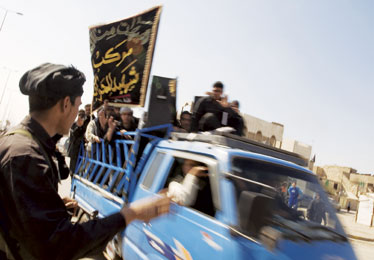Operation enduring chaos: The retreat of the coalition & rise of the militias
 Iraq's savage sectarian war, with its indiscriminate torture and killings, is an even greater obstacle to peace than the insurgency. What will happen to the country when the coalition troops eventually pull out? Kim Sengupta reports
Iraq's savage sectarian war, with its indiscriminate torture and killings, is an even greater obstacle to peace than the insurgency. What will happen to the country when the coalition troops eventually pull out? Kim Sengupta reportsPublished: 29 October 2006
The message to the Baghdad morgue was simple - they could do what they liked with the plastic handcuffs, but the metal ones were expensive and needed to be returned. Such is the murderous state of affairs in Iraq at the moment that the demand, made by a militia gunman who is also believed to be a member of the Special Police Commandos, hardly caused a stir.
There was a similar lack of shock when a dozen bodies were brought in with identification cards showing that each had the name Omar. The catch here was that Omar is a Sunni name, and this fact was enough to seal their fate at Shia checkpoints.
Baghdad is full of checkpoints. Leaving the Hamra Hotel, where the dwindling band of British journalists outside the Green Zone stay, means negotiating the Badr Brigade, their Shia competitors the Mehdi Army of Moqtada al-Sadr, and the Kurdish peshmerga. The Iraqi police and the government paramilitaries, in the meantime, have their own barriers. And there are others: the Shia Defenders of Khadamiya, set up by Moqtada's cousin Hussein al-Sadr, and the government-backed Tiger and Scorpion brigades.
They all have similar looks: balaclavas or wrap-around sunglasses and headbands, black leather gloves with fingers cut off, and a very lethal arsenal of weapons. When not manning checkpoints, they hurtle through the streets in 4x4s, scattering the traffic by firing in the air. Out of sight, they stand accused of arbitrary arrests and extrajudicial killings.
This is a shadowy struggle, which involves tortured prisoners huddled in dungeons, murder victims mutilated with knives and electric drills, and distraught families searching for relations who have been "disappeared".
Iraq's savage sectarian war is now regarded as a greater obstacle to any semblance of peace returning than the insurgency, and was the main reason for the Americans recently pouring 12,000 troops into the capital - an operation that, they now acknowledge, has failed.
LinkHere




0 Comments:
Post a Comment
<< Home